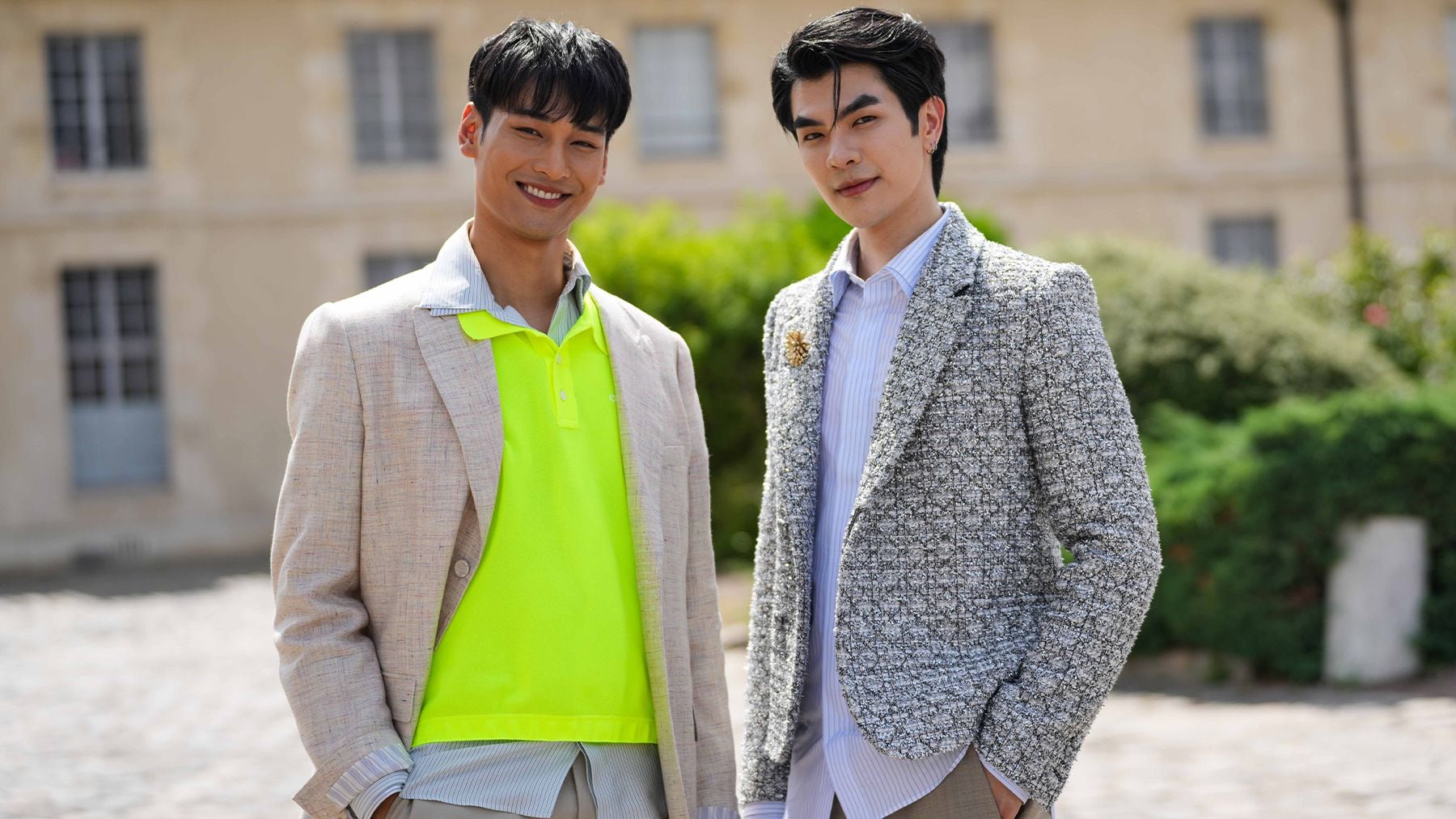
Back in February, Nattawin Wattanagitiphat’s fans spared no expense in marking the Thai actor’s 29th birthday. Videos that made their way onto social media showed ‘Apo’, as he is affectionately known, wading through a sea of flower bouquet stands, multiple cakes towering over six feet tall, gold bars, cash and even a Rolex watch all gifted by his fan base. Local media reported his birthday haul totalled 50 million Thai baht or around $1.4 million.
With such an army of intense supporters behind him, it’s little wonder then that Apo was named by Christian Dior as a men’s ambassador this summer, along with his co-star Phakphum ‘Mile’ Romsaithong. The two actors, who star as an on-screen couple in a BL television series (a “boys’ love” drama featuring gay romance themes) called KinnPorsche, have become a valuable marketing vehicle for the brand. The pair have appeared at events across Asia, including Dior’s show in India, and on the covers of various editions of Vogue, GQ and other magazines.
One reason they provide a good return on investment is the remarkably high engagement they generate on social media. Data from Lefty.io, a social media analytics company found that Apo and Mile were ranked 3rd and 5th in earned media value for the Spring/Summer 2024 show season on Instagram and TikTok, only after Kylie Jenner and Zendaya, who have 399 million and 185 million followers respectively on Instagram. In comparison, the Thai actors have just 3.5 million Instagram followers each. Still, they are able to induce an intense fanaticism that’s typically only seen with South Korean stars.
But Apo and Mile are not the only Thai celebrities gaining traction as brand ambassadors, campaign models and fashion muses. The country has emerged as a hotspot for talent with Dior adding yet another ambassador for Thailand this month, actress Tontawan Tantivejakul.
Dior would not be drawn on its decision to focus on Thai celebrities, instead describing the three ambassadors in a statement as “exceptional personalities who are always singular, audacious, virtuosos of their fields, symbolising the zeitgeist.”
But the growing popularity of ambassadors from Thailand is no doubt underpinned by the country’s status as a key emerging market for luxury brands, and its role as a cultural, economic and tourism hub not only for Southeast Asia but the wider Asia-Pacific region. Famously welcoming to foreigners, its capital Bangkok frequently ranks as the most visited city in the world according to a Mastercard Index. And the Thai luxury market is “leading growth” in Southeast Asia, according to a report released this month by consultancy Bain & Company.
Thailand’s biggest global star is arguably musician Lalisa Manobal from Blackpink. Better known as Lisa, the Celine and Bulgari ambassador has 99 million followers on Instagram and is an internationally popular member of the K-pop girl group. There’s also Bambam (real name: Kunpimook Bhuwakul) who followed the K-pop trajectory to fame as part of the now defunct boyband GOT7. He has appeared in YSL Beauty ads and, more recently, attended Pharrell Williams’ debut Louis Vuitton show.
But more often than not, the Thai stars who are able to build international fan bases tend to be actors. Davika Hoorne, who starred in Pee Mak, Thailand’s highest grossing film of all time, was named Gucci’s first global brand ambassador from the country last year. Urassaya Sperbund, the Thai-Norwegian actress and model who starred in a Louis Vuitton watch campaign in 2019, rose to international acclaim earlier as the first Thai celebrity to feature in American Vogue.
The author has shared an Instagram Post.You will need to accept and consent to the use of cookies and similar technologies by our third-party partners (including: YouTube, Instagram or Twitter), in order to view embedded content in this article and others you may visit in future.
Some of the actors generating the biggest buzz are male celebrities, more specifically those appearing in gay romance plotlines. This summer, Bright (Vachirawit Chivaaree), who starred in the popular show “2gether: The Series” was unveiled by Calvin Klein as its new face, on the heels of a Burberry brand ambassadorship. Bright’s co-star on the show, “Win” Metawin Opas-iamkajorn, has also made a big impact, signing on with Prada at the start of this year.
The celebrity endorsement market has evolved into a large enough opportunity that former Vogue Thailand editor Nichapat Suphap this month launched Venture Management, an agency representing leading Thai stars overseas. Starting with six names, in addition to Apo and Mile, Suphap’s firm manages Bright, Wichapas “Bible” Sumettikul, another actor from KinnPorsche who starred in a Ralph Lauren fragrance advertisement this year, and actor Kanawut “Gulf” Traipipattanapong, who has appeared at events for Gucci.
Currently, Suphap says she’s negotiating deals with luxury watch, luggage and camera brands for her array of celebrities. It’s a far cry from just a few years ago when Thai figures were relegated to the sidelines. “We were not the priority when attending events abroad; [Thais] got the leftover looks from western celebrities.”
“But now things have changed. Fashion shows shed more spotlight on Thai talents [so] we get custom looks [as] we become more the centre of attention because of the number of fans waiting outside the shows and the amount of online engagement brands get,” Suphap explained.
The author has shared an Instagram Post.You will need to accept and consent to the use of cookies and similar technologies by our third-party partners (including: YouTube, Instagram or Twitter), in order to view embedded content in this article and others you may visit in future.
According to data from Launchmetrics, the latest S/S 2024 Christian Dior womenswear show in Paris saw Apo and Mile garner $6 million in media impact value (MIV) each. That puts them nearly on par with Korean musician Jisoo from Blackpink, who generated a MIV of $6.5 million, but ahead of western stars Jennifer Lawrence ($4.5 million), Robert Pattison ($2.7 million) and Rosalía ($3.7 million).
Fatti Laleh, Piaget’s global communications and image director, said she witnessed the fandom first hand for Apo, who she later signed as a friend for the watch and jewellery house.
“He walked with me outside of this five-star hotel during fashion week and I was amazed to see with my own eyes the magnitude of the people that were cheering for him and waiting for him,” Laleh said, adding that many of the fans gathered were European, demonstrating a degree of global appeal. “Beyond the cultural capital, his beauty and aesthetics, it’s what he reaches in media for us.”
Although that kind of loyalty may bear a resemblance to major K-pop stars that are well entrenched within the fashion industry, there are differences to working with Thai talent. Because the Thai entertainment industry is not yet as structured or strictly managed as Korea’s, agencies take a more relatable approach to partnerships, suggests Krisda Witthayakhajorndet, the director of KinnPorsche.
“Thais are humble and fun,” he said. “Off-screen, I let my actors be themselves… [They’re] not perfect idols. I think the audiences can feel that… [and] I think people are looking for something that’s not that perfect anymore.”
Witthayakhajorndet adds that fan interactions are generally looser too.
Venture Management’s Suphap agrees. “K-pop stars dedicated their lives training [from a young age] to be idols,” but Thai stars, she said, can be more relaxed. For example, they often manage to attend a regular school even while building their public profile.
“Of course, we still want to keep them exclusive, but I would say we are more friendly with the fans,” she said. “We say hi to them, we take pictures with some. We don’t really keep the talent in a box like Korean companies do.”
Another advantage some Thai celebrities have is their ability to resonate among Chinese audiences. While South Korean celebrities are often still not allowed to be promoted in the country because of political tensions between the two nations, Thais avoids that issue. Moreover, fourteen percent of Thailand’s population are ethnic Chinese and the number is much higher for those of mixed Chinese-Thai heritage.
The biggest obstacle to Thai celebrities becoming even more of a worldwide phenomenon, Suphap says, is something they share with other nationalities across the region: a language barrier.
Generally, “they can understand and converse in English of course,” said. “But to give an interview can be a challenge because we can’t express our in-depth knowledge in a matter of seconds. English is definitely the biggest challenge right now.”



